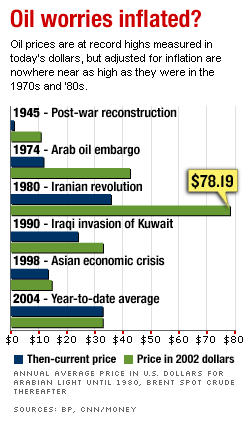NEW YORK (CNN/Money) -
Oil prices eased off record highs Monday as traders believed the geopolitical events of the last several weeks have been priced into the market.
Prices spiked early on news that a suicide bomber killed Izzedine Salim, the president of Iraq's governing council, Monday morning in Baghdad, rattling the U.S.-backed coalition as it prepares for Iraqi sovereignty on June 30.

U.S. light crude for July delivery reached $41.50 a barrel, before pulling back to $41.48 in late afternoon trade on the NYMEX, up 18 cents from Friday. The June contract hit $41.85 a barrel, the highest price since the New York Mercantile Exchange launched the crude contract in 1983.
London's Brent crude for July delivery settled at $37.93 on the NYMEX, down from $37.95 late Friday.
"Last week it was 'buy the rumor, sell the fact' with all the conflict in Iraq," said Phil Flynn, energy analyst with Alaron Trading. "I think we're getting closer to the top, barring any catastrophes, with oil in the $38-$42 a barrel range over the summer."
However, Flynn added that another blip on the geopolitical scene could cause crude prices to spike to $45 a barrel.
Low U.S. gasoline inventories ahead of peak demand in the summer months, a surge in global consumption driven by healthy economic growth and worries that instability in the Middle East may disrupt supplies have driven crude prices up $9 a barrel, or 28 percent, since the end of last year.
| Related stories
|

|
|
|
|
Calming concern about rising prices was an article in the Wall Street Journal that the United States is continuing to build its strategic oil stockpile amid the soaring prices, and the market is ignoring the buildup of these reserves.
The U.S. has led consumer countries' calls on the OPEC producer cartel to release more supply as fears gather of inflation and a slowdown in economic growth.
OPEC, which controls half of world crude exports, will convene informally later this week on the sidelines of an Amsterdam conference and again in Beirut on June 3 for a full ministerial meeting.
Ministers will discuss a proposal from Saudi Arabia to raise the group's official production limits by at least 1.5 million barrels per day (bpd) to cool prices.
OPEC 'not happy'
OPEC President Purnomo Yusgiantoro said Monday the cartel was unhappy with such high oil prices.
"High oil prices can cause recession. We are not happy with high oil prices," said Purnomo, who is also Indonesia's oil minister.
Even so, oil dealers are skeptical OPEC has enough spare production capacity to bring prices down as most OPEC countries, except top exporter Saudi Arabia, are producing flat out.
The group is currently pumping more than two million bpd above its official production ceiling of 23.5 million bpd to feed demand, which has been especially strong in China and the U.S.

-- Reuters contributed to this story.
|

